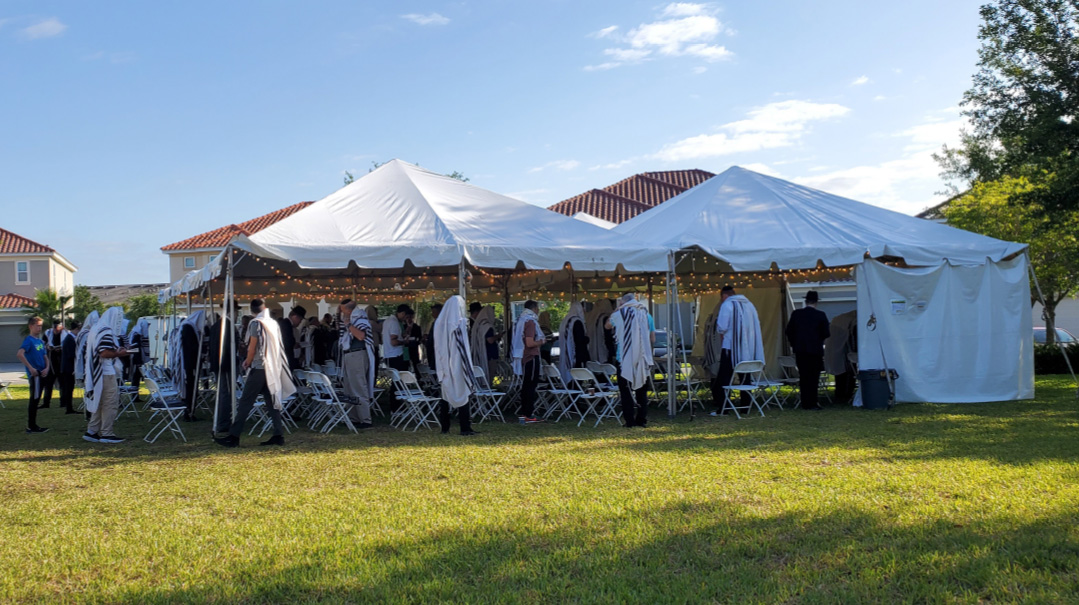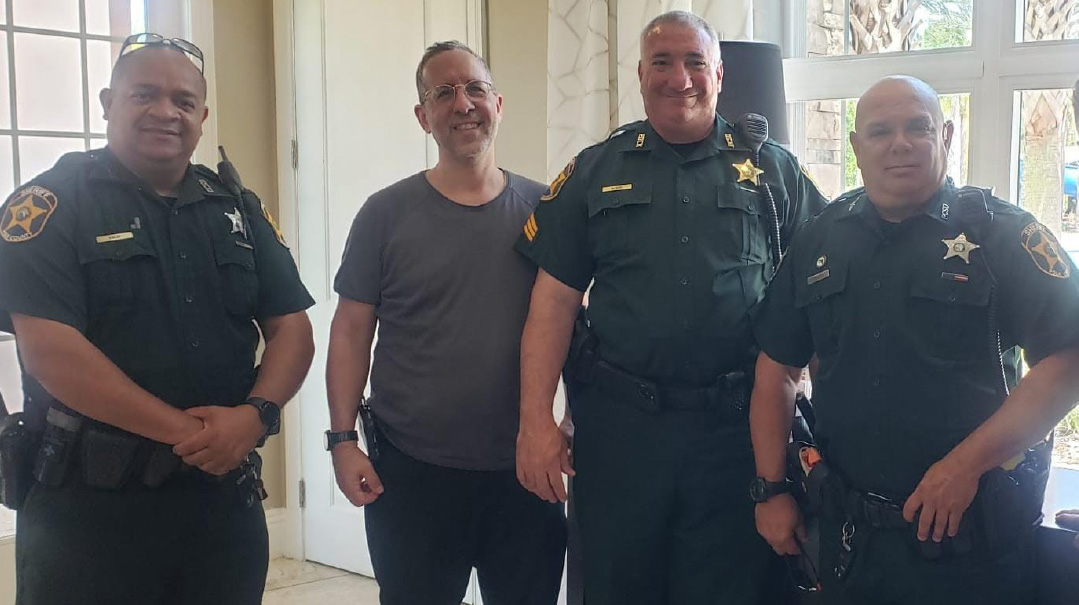Order in Orlando
| April 9, 2024For Avromi Perkowski, who works tirelessly with no commission, it’s all about helping others enjoy their holiday

Photos: Avi Gass
Avromi Perkowski remembers getting that frantic call on Erev Pesach nine years ago. A friend of his had arrived in Orlando, Florida, for Yom Tov — and found that the home he had booked was already occupied. After some discussion, they discovered that the home had been sold after an agent rented it to Avromi’s friend, but the agent hadn’t bothered to inform the new homeowner about prior bookings.
A trained emergency responder who volunteers for Flatbush Hatzoloh, Avromi’s rescue instinct kicked in. After a flurry of phone calls and urgent messages, they found his friend a different home, with just hours to spare until Pesach began.
Unfortunately, Avromi’s friend wasn’t the only one who discovered his Pesach house wasn’t available upon arrival in Orlando. Some dishonest agents in the area were in the habit of listing booked homes for rent in the hopes of landing a higher-paying guest — and when they got a better offer, they would transfer the reservation without informing the first guest. Then there were agents who were outright frauds who listed homes they had no right to rent, took the rental fees, and ran. At the time, there was no effective mechanism in place to stop these scams.
“Families would show up in Orlando and find themselves stranded,” remembers Avromi, who lives with his family in Flatbush and has been going to Orlando’s Solterra Resort for Pesach for close to a decade.
Within the health care world, where Avromi is the COO of The Veritas Healthcare Solutions, they say an ounce of prevention is worth a pound of cure. Avromi applied that maxim to the Orlando oilem.
“I came up with a simple solution: A few of us created a spreadsheet that we share,” he explains. “We track the addresses of all guests who plan to spend Pesach in the area.”
Every family that books a Solterra Resort home notifies Avromi, who adds it to the spreadsheet. Once a home is booked, other families know regardless of its online status, that address is reserved, and while scams still exist, this effectively stopped double-booking issues.
“This year alone, six homes were almost booked twice, but the second families were notified that the ‘available’ home was already booked by checking our spreadsheet,” he says, adding that this also helps weed out fraudulent agents. Renters in different Orlando resorts collaborate and share information, and if something smells off, they’ll investigate and warn others off that agent.
Travelers also started see Avromi’s name as the administrator of several Orlando WhatsApp groups, and they reached out for other booking-related questions, like which areas to rent in and how to book a home. Avromi is no real estate agent, and he gets no commission from services rendered, but that hasn’t stop him from embracing his role: helping 150 families enjoy their Pesach in the Solterra Resort in Orlando.

Avromi rented an open grass field and ordered a huge 300-person tent for davening, and then realized he needed an eiruv to go with it – which turned out to be a blessing
M
ost people are “happy to help.” Then there are folks like Avromi, a tall man with youthful energy and an easygoing manner, who are absolutely thrilled to do anything and everything to lend a hand. Even a casual encounter with the Flatbush native, longtime Hatzoloh member, and NYPD liaison is enough to sense Avromi’s care and eagerness to accommodate.
As the years passed, Avromi took on more pro bono responsibilities. He started by coordinating minyanim in Orlando garages and private homes, an arrangement that lasted four years, until 2020. With strict stay-at-home Covid measures in place, no one was going on vacation, and like hundreds of others, Avrumi and his family stayed put as lockdown and social distancing became a way of life.
But after the initial shock wore off, Orlando beckoned. Its vacation rental homes offered families a practical way to enjoy airier and sunnier quarters — along with a private pool.
Avromi remembers his wife Ruchie turning to him after Pesach in Flatbush.
“She said we have two options: we can stay home and watch the kids swordfight, play indoor hockey, destroy the house — and then pay for three years of therapy — or we can escape to Orlando for two weeks.”
He chose the latter.
“I paid pennies for a house and we ended up staying for two months, through Shavuos. My children were Zooming in the pool for classes and there were zero Covid concerns.”
After that year, Orlando crowds ballooned. Avromi predicted that the guests would far exceed capacity in cramped living rooms and garages for tefillos. He rented an open grass field in a central location and arranged for a large, 300-person tent for davening. He didn’t foresee that mispallelim, who used to bring siddurim and talleism before the onset of Shabbos and walk to shul without any possessions, would need a way to carry to their new makom tefillah on Shabbos, thus necessitating an eiruv.
“That actually turned out to be a big deal,” Avromi remembers.
He reached out to Rabbi Michoel Rennert, Orlando Torah Academy’s director of business development who also runs Kosher Orlando, a one-stop resource for utensils and services for families visiting for Pesach. Rabbi Rennert had tried to erect an eiruv in the resort, but the logistics were complicated and the local Homeowners Association (HOA) was resistant.
Avromi asked him what he figured it would cost to construct the eiruv, including materials, labor, and insurance.
“The estimate was at least $10,000.”
Undeterred, Avromi raised the money from other renters and friends on his Orlando WhatsApp groups.
“I was excited to get going on the project, but then I discovered that money was just one of the hurdles I’d have to clear. Putting up an eiruv in a vacation resort meant I had to get the green light from the local Homeowners Association — and they were not eager to help.”
When he broached the idea with Solterra’s HOA, they pushed back vehemently. Avromi held his ground, maintaining that as the majority of renters, the Jewish visitors had the right to put up what was essentially some harmless fishing string on the telephone poles. The HOA was just as firm in their opposition; an incensed secular Jew even filed a lawsuit to keep him from going ahead with it.
Avromi retained legal counsel who had a judge put a stop to the suit, but the HOA still didn’t budge. After months of tussling, the two parties came to a compromise: The eiruv would be allowed, but only if Avromi satisfied several contingencies: He’d have to purchase an insurance policy and sign a detailed waiver accepting liability for any damages from the eiruv and indemnifying the HOA of any associated responsibilities.
Avromi purchased the requisite insurance, signed the waiver, and went along with the rest of the requirements.
“It was definitely a hassle,” he recalls. “But we now have our eiruv!”

As an NYPD liaison, Avromi is able to explain the halachic considerations faced by Jewish visitors to the fellows at Solterra’s local sherrif’s outpost
A
vromi’s numerous eiruv negotiation dealings with Solterra’s HOA revealed another, more glaring issue.
“I saw that many of the Solterra locals struggled with simmering resentment against the ‘Passover guests,’ ” he says.
Many of the visitors’ behaviors mystified them, or worse, left them frustrated and embittered, and Avromi understood why.
“Think about it: The day before a Jewish holiday, a huge van pulls up in front of a house. Out of the van tumbles a large family — it looks more like a party than a family on a getaway,” he says, explaining that parties are prohibited in the home rental world, as they can get out of hand and destructive, especially when a group comes with 35-plus boxes. “That looks very suspicious for a vacationer renting a house for ten days.”
The locals had so many questions — and until Avromi started frequenting the HOA headquarters, had no one to ask.
Avromi rattles off a list of questions he encountered: “Why are these Jews bringing so much stuff with them? Why do they insist on covering security cameras and disabling motion detectors before the holiday begins? Why do they walk in the streets instead of on the sidewalks? Why are they always cutting through my private property to get to other houses?”
For Avromi, this was the chance to clear up misconceptions and create a kiddush Hashem. In one conversation after another, in person and online, Avromi happily and patiently explained the Orthodox lifestyle to the befuddled Orlandoans.
“I explained to the locals that their Jewish guests aren’t like the typical non-Jewish vacationers, who can use the dishes and appliances in their rental homes and go out to eat in fast food joints or restaurants whenever they feel like it. The Jewish guests have to follow very strict dietary rules, especially on Pesach, so they have to bring all their food with them.”
Avromi even made the case that these restrictions are better for the homeowners, because renters won’t touch the homeowners’ dishes, cutlery, and kitchen appliances, so there would be no wear and tear or damage.
The sheer amount of garbage was another issue.
“One of the big complaints was that the renters generate So. Much. Garbage,” Avromi says, punctuating his words with a laugh. “I explain that they use disposable dishes, utensils, and tablecloths for all meals — it’s a lot! The owners are always relieved to hear these explanations and make sense of the situation. I even collect money from each family to help pay for extra garbage pickup, to satisfy the homeowners’ concern.”
One homeowner was amazed when Avromi explained that his Jewish guests were removing the battery from the electronic door lock because they wouldn’t be able to open the door on Shabbos otherwise.
“If I’d known that sooner, I would have supplied them with ordinary keys,” he said. “I make a fortune from this holiday — these are my best customers. I would have been thrilled to accommodate them.”
Another shared that he’d been struggling to reach a client for days, but he wasn’t answering his phone. “I gave him a quick crash course on the halachos of Shabbos and Yom Tov,” recalls Avromi. “Mystery solved.”
As to why the Orthodox families tend to spill over into the streets, he explained that a family with eight kids can’t easily fit onto a sidewalk designed for Dad, Mom, a kid, and a dog, and the low volume of cars on the road on Yom Tov makes the street particularly inviting.
One of Avromi’s most memorable interactions was with an unaffiliated Jewish woman who served as the HOA liaison.
“I meet with the HOA liaison every year well in advance of Pesach to avoid any misunderstandings. One, let’s call her Melissa, told me that there are two issues homeowners complain about every year,” Avromi says. He expected garbage or motion detector sh’eilahs, but he was in for a surprise when Melissa stated, “The first issue is the slaughtering of the lambs. This is a very big problem, it leaves bloodstains on the carpets.”
Evidently, a homeowner had once heard something about the Korban Pesach and had leaped to the mistaken conclusion that every Jewish family slaughters a lamb in their home on Yom Tov — and this rumor somehow took wings.
“I can assure you that none of the guests are slaughtering lambs in their rented homes,” Avromi said calmly. “There might be wine stains on the carpets from spills at the Seder meals, but there is no slaughtering.”
The next issue involved a creative explanation concocted by a very misinformed person.
“The guests tend to walk through private backyards,” Melissa told Avromi. “But I explained to the other homeowners that this is because the Jews have an obligation to inhabit G-d’s land, and they walk through the yards to show that the land belongs to them. That may have appeased them.”
Once again, Avromi was happy to explain that there is no commandment that requires us to settle anyone else’s land or walk through anyone’s backyard.
Avromi developed a good relationship with Melissa, and ultimately, she proved to be a valuable ally. She secured permission for the Jewish visitors to construct an eiruv and hold minyanim in the tent when a new HOA board was voted in. She also facilitated conversations between Avromi and any homeowner with questions or complaints, which allowed him to clear up more misunderstandings.
With a new appreciation for the peculiar customs of her devout coreligionists, Melissa even reached out to the Perkowskis and asked to join their Seder. Avromi knew she was married to a non-Jew, which would be problematic on Yom Tov, so he consulted with his rav who advised they invite Melissa for a Shabbos meal. In the end, her husband couldn’t make it, and she brought along her (Jewish) mother instead.
“The mother was born to a non-religious family in Bensonhurst, and the seudah brought back warm memories. Melissa, who grew up without any interactions with Orthodox Jews until we started coming to Orlando, was also moved by the seudah. She has a house in Solterra, and we’re still in touch,” Avromi tells me.
As part of his service, Avromi offers a dos and don’ts list for frum renters to alert them to behaviors that may elicit bad feelings.
“Things come up because guests are far from home, without a hardware store on every corner,” Avromi explains, citing the example of covering counters. People often use Scotch or masking tape to fasten foil to countertops, but these tend to leave sticky residue and can even ruin surfaces.
“No one would do that in their own home, but when you’re packing for Yom Tov, it doesn’t occur to you to bring a roll of painter’s tape, which peels off easily without leaving marks,” he says.
He also tries to implement simple solutions to smooth the process all around.
“The first year that we had our tent, I had a major cleanup job after davening every day: the tissues, the leftover coffee cups, the candy wrappers. I put four large garbage pails outside the tent, and the mess has been kept to a minimum since then.”

A
vromi gets to work on Pesach arrangements as early as Chanukah, when he starts the spreadsheet of rented addresses and moves ahead with tent rental, permits and permissions from the HOA, and more.
Before Pesach, he and Rabbi Rennert put up the eiruv. Avromi also meets with the captain at Solterra’s local sheriff’s outpost, using his experience as an NYPD liaison to explain the halachic considerations faced by Jewish visitors over Pesach. He gives them copies of The Professionals Guide to Understanding Judaism, which was written by the National Chaplains Association with law enforcement in mind and explains basic Jewish law to help them understand an unfamiliar culture.
Last year, Avromi benefitted personally from his efforts.
“One of my children lit a 12-hour candle just before Yom Tov. After the Seder, the candle still had hours left to burn, and I didn’t feel safe going to sleep while it was still lit. I walked to the sheriff’s outpost and told the officer on duty about my predicament, hinting that I needed him to put out the candle for me.”
The officer smiled. “Of course I’ll help!” he said. “Captain Davies told us to expect a bunch of requests like this over the weekend.”
Avromi is now busy, as usual, putting arrangements into place.
Come Erev Yom Tov, travelers will arrive in Orlando. They will find rental homes ready to welcome them, a schedule of minyanim and a Daf Yomi shiur, an eiruv, and more — but this year, Avromi won’t be joining them.
“I’m taking a one-year sabbatical with my married children in Flatbush due to an expected birth in the family,” he explains.
But his personal simchah will not impede the Pesach experience of the hundreds of Jews relying on him. He still plans to fly to Orlando the Thursday before Yom Tov and to head to Solterra — a frum-friendly haven for Orlando’s Passover guests, due to his efforts. There, he’ll make sure the eiruv, tent, and shul are ready for the influx.
(Originally featured in Mishpacha, Issue 1007)
Oops! We could not locate your form.







